Hier in unserer Leseecke sammeln wir investigative Recherchen, Berichte und andere Publikationen von zivilgesellschaftlichen Organisationen, welche sich mit den vielfältigen Aspekten der fairen Elektronik beschäftigen. Die hier gesammelten Dokumente sind nur ein kleiner Ausschnitt der umfassenden Berichtslage. Alle Berichte lassen sich frei herunterladen und eignen sich sehr gut für einen tiefen thematischen Einstieg in Unterthemen der fairen Elektronik.
Rohstoffe
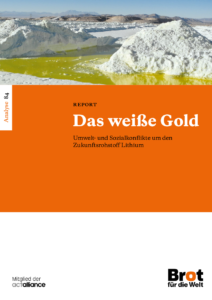 Das weiße Gold – Umwelt- und Sozialkonflikte um den Zukunftsrohstoff Lithium (Brot für die Welt, 2018)
Das weiße Gold – Umwelt- und Sozialkonflikte um den Zukunftsrohstoff Lithium (Brot für die Welt, 2018)
Lithium ‒ das sogenannte weiße Gold ‒ ist für die deutsche Wirtschaft von enormer Bedeutung. Das Leichtmetall wird aufgrund seiner hervorragenden Speicherkapazitäten zur Herstellung von Batterien für Elektrofahrzeuge verwendet. […] Weil die Förderung von Lithium extrem wasserintensiv ist, sinkt der Grundwasserspiegel, angrenzende Flüsse und Vegetation vertrocknen. Für die indigenen Gemeinschaften vor Ort wird es immer schwieriger, ihrer traditionellen Lebensweise, die sich auf Viehzucht, Landwirtschaft und die Gewinnung von Salz gründet, nachzugehen.
Download von Brot für die Welt
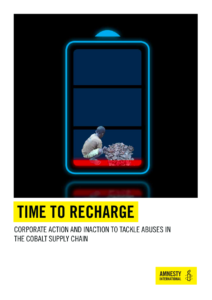 Time to recharge – Corporate action and inaction to tackle abuses in the cobalt supply chain (Amnesty International, 2017)
Time to recharge – Corporate action and inaction to tackle abuses in the cobalt supply chain (Amnesty International, 2017)
This report builds on This is What We Die For (AFR 62/3183/2016), first published by Amnesty International and Afrewatch in 2016, which showed how cobalt mined by children and adults in hazardous conditions in the DRC entered the supply chains of many of the world’s biggest brands. This report assesses the policies and practices of 29 companies and how much their cobalt-sourcing practices have improved since then. While there have been signs of progress by some companies, too many continue to lag behind.
Download von Amnesty International
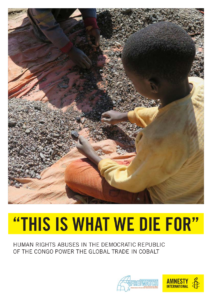 „This is what we die for“ – Human rights abuses in the Democratic Republic of the Congo power the global trade in cobalt (Amnesty International, 2016)
„This is what we die for“ – Human rights abuses in the Democratic Republic of the Congo power the global trade in cobalt (Amnesty International, 2016)
This report documents the hazardous conditions in which artisanal miners, including thousands of children, mine cobalt in the Democratic Republic of the Congo. It goes on to trace how this cobalt is used to power mobile phones, laptop computers, and other portable electronic devices. Using basic hand tools, miners dig out rocks from tunnels deep underground, and accidents are common. Despite the potentially fatal health effects of prolonged exposure to cobalt, adult and child miners work without even the most basic protective equipment.
Download von Amnesty International
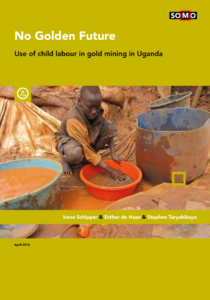 No Golden Future – Use of child labour in gold mining in Uganda (SOMO, 2016)
No Golden Future – Use of child labour in gold mining in Uganda (SOMO, 2016)
A large number of children work in Uganda’s artisanal gold mines. Of all the artisanal gold miners in Uganda, between 20 to 30 per cent are children. Some children (periodically) attend primary school whilst still working in the mines to pay for their education, clothes and books. Many other children work in the mines throughout the year and some even live on the mining sites.
Gold mining is arduous work even for adults, but for children the conditions are even more unsafe, unhealthy and the exposure to hazardous and toxic chemicals, including mercury, can lead to life-long health problems.
Download von GoodElectronics
Zulieferer
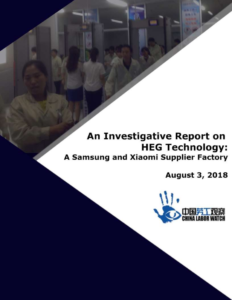 An Investigative Report on HEG Technology: A Samsung and Xiaomi Supplier Factory (China Labor Watch, 2018)
An Investigative Report on HEG Technology: A Samsung and Xiaomi Supplier Factory (China Labor Watch, 2018)
HEG is a state-controlled company that supplies to brand companies, including Samsung, Oppo, Xiaomi and TCL. CLW’s initial investigation in 2012 into HEG uncovered major rights violations such as child labor, unpaid wages for student workers, and discriminatory hiring practices. Since CLW’s initial report and subsequent follow up investigations, there have been a number of notable improvements at HEG. […] However, in some areas, HEG has regressed.
Download von China Labor Watch
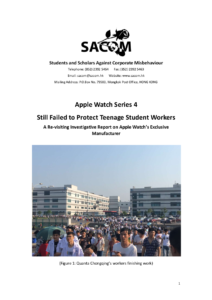 Apple Watch Series 4 – Still Failed to Protect Teenage Student Workers (SACOM, 2018)
Apple Watch Series 4 – Still Failed to Protect Teenage Student Workers (SACOM, 2018)
This report discloses that Apple Inc. is undoubtedly manufacturing Apple Watch in Quanta Chongqing facilities using significant numbers of student workers aged 16-19 years. It also reveals that working conditions for student interns in the factory do not comply with the “Administrative Provisions Regarding Internships for Vocational School Students” issued by the Chinese government and the “Student Worker Protections” explicated in Apple’s “Supplier Responsibility Standards”.
Download von SACOM
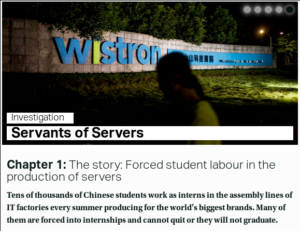 Servants of Servers (Danwatch, 2015)
Servants of Servers (Danwatch, 2015)
Tens of thousands of Chinese students work as interns in the assembly lines of IT factories every summer producing for the world’s biggest brands. Many of them are forced into internships and cannot quit or they will not graduate.
Download von Danwatch
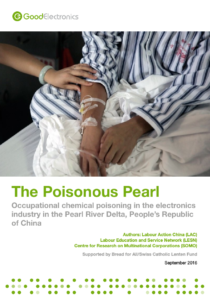 The Poisonous Pearl – Occupational chemical poisoning in the electronics industry in the Pearl River Delta, People’s Republic of China (GoodElectronics, 2016)
The Poisonous Pearl – Occupational chemical poisoning in the electronics industry in the Pearl River Delta, People’s Republic of China (GoodElectronics, 2016)
The Poisonous Pearl, the latest report from GoodElectronics, focuses on the experiences of (former) workers in the electronics industry in China who are victims of chemical poisoning. The health of all the workers in the report was damaged by exposure to hazardous chemicals such as benzene and N-hexane in their work. All were working in large or small factories in the Pearl River Delta-region of China, an area well known as being a global hub for the production of consumer electronics (ICT). Manufacturers based in this region supply components to international brand name companies such as Apple, Asus, Canon, Huawei, Nokia, Samsung and Sony, amongst others.
Download von GoodElectronics
